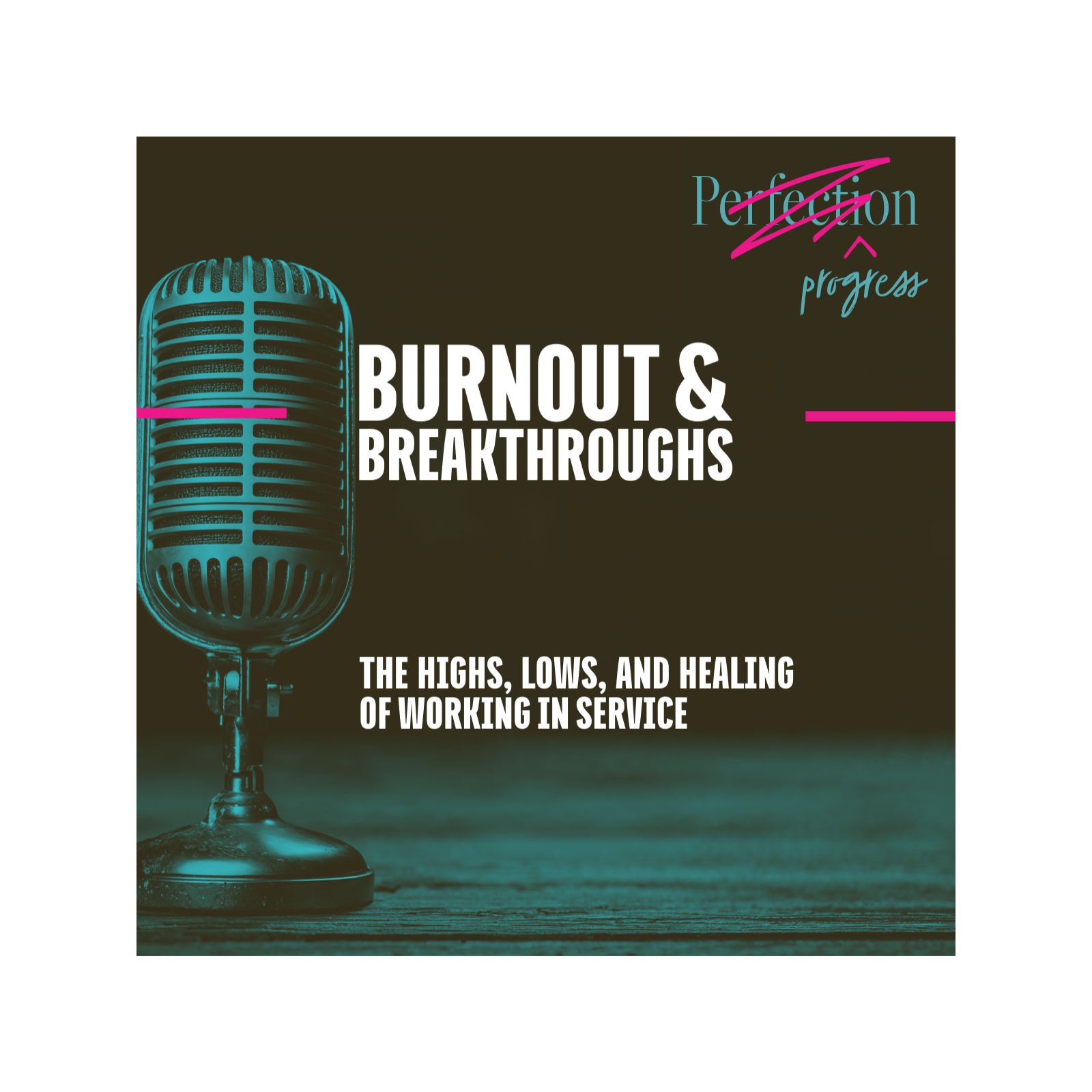The Atlas Complex: From Parentified Children to Burnt-Out Caregivers

"Other duties as assigned" feels less like flexibility and more like destiny.
Working in service, I've had the pleasure of meeting a variety of people from all over, but one of the things that I've noticed is that there's a particular type of person who gravitates toward service work. You probably know them; they're the ones who volunteer to stay late to help that one client, the person who somehow becomes the unofficial mediator between rising tensions between two coworkers who don't get along. They are the ones who instinctively step in when they see someone falling through the cracks. They're competent, caring, and chronically overwhelmed. They carry the weight of the world on their shoulders, and they've been doing it so long they can't remember when it started.
I know this person intimately, because this person has been me.
The Atlas Complex: When Your Identity Becomes Your Burden
The Greek titan Atlas was condemned to hold up the heavens as punishment from Zeus for leading the Titans against the Olympian Gods. Like many nonprofit workers, Atlas carried an impossible burden that was never truly his choice. Thrust upon him by forces beyond his control and expected to bear it without complaint. The most revealing myth involves Atlas's role in Hercules' twelve labors, where Hercules asked Atlas to fetch the golden apples from the Hesperides' gardens. Hercules offered to shoulder the world temporarily, giving Atlas his first break in eons. But when Atlas returned with the apples, he was understandably reluctant to resume his crushing burden, until Hercules tricked him back into position.
This moment reveals a painful truth for nonprofit workers. When you finally experience what it feels like not to carry the weight of the world, returning to that burden becomes almost unbearable. Yet unlike Atlas, nonprofit workers have a choice. The lesson isn't that we should trick others into carrying our load, but that we must set boundaries to prevent becoming permanently trapped under burdens that were never ours alone to bear. Setting boundaries is not a sign of weakness, but a powerful tool for self-preservation and effective caregiving.
But somewhere along the way, many of us in service work internalized a different version of this myth: that holding up our corner of the world isn't a burden imposed on us, but evidence of our strength, our worth, and our indispensability.
This is the Atlas Complex, and it's why "other duties as assigned" has become less of a job description clause and more of a way of life for so many of us in helping professions.
The Tell-Tale Signs (You Might Recognize Yourself Here)
The Atlas Complex manifests in predictable patterns, although it took me years of therapy to recognize them in my own behavior.
The Indispensability Belief: "If I don't do it, it won't get done right." This isn't necessarily arrogance; it's often based on real experience. You've seen what happens when you don't step in. Things genuinely do fall apart, clients suffer, colleagues struggle, and the mission falters. So you step in, again and again, until it becomes your default response to any organizational gap.
The Hypervigilance Pattern: Your nervous system stays locked in a state of activation, constantly scanning for problems to solve, needs to meet, and crises to prevent. Rest feels irresponsible or that we are not worthy of it, especially when there's always another fire that needs putting out. I used to check work emails while brushing my teeth, well before the start of the actual work day, because my brain couldn't turn off the threat detection system.
The Guilt-Driven Yes: Saying no feels like betrayal. It feels like you are letting down your colleagues, your clients, your values, and honestly, yourself. The word "boundaries" makes you squirm because boundaries feel selfish when people are counting on you. How do you say no to staying late when it means a client might not get the help they need? It's a struggle we all face, and it's okay to feel this way. Learning to say no is a process, and it's a journey we can take together.
The Identity Fusion: Your sense of self becomes so intertwined with your ability to help others that stepping back feels like losing yourself entirely. If you were to step away from your caregiving role, the thought terrifies you because who are you, if you aren't caring for everyone else? Who are you if you're not the person everyone turns to during a crisis? This question can trigger genuine panic for those of us caught in the Atlas Complex.
If you're nodding along, you're definitely not alone. The Atlas Complex is remarkably common among helping professionals, and it didn't just appear out of nowhere. When we share these experiences, we begin to understand them. And that is the first step towards healing and preventing burnout.
When Children Become the Adults in the Room
Understanding the Atlas Complex requires examining where it often begins: in childhood homes where the usual roles are usually flipped upside down. This might not make sense right now, but just stay with me because understanding the origins helps explain why this pattern feels so automatic and inevitable for those of us.
Parentification is what happens when children are given responsibilities that exceed their developmental capacity. The child becomes responsible for keeping the family functioning as a unit. Sometimes it's obvious; you may see kids caring for younger siblings while parents struggle with addiction or mental illness. But often it's more subtle; the child ends up becoming the family's emotional thermostat, the one who keeps everyone calm and happy. Growing up, I would call myself "Sweden" because I was the person who would be the one who would have to mediate issues or frustrations between my mother and my younger siblings. I'd never get involved in any of the fights, but rather try to smooth things over so that the environment was less explosive.
The Atlas personality falls within a specific category of parentified children. These were the children whose primary responsibility was caring for a parent. Still, unlike other parentified children who had clear, consistent expectations, Atlas children had to respond and improvise to momentary, volatile, chaotic demands. One day they needed to be the family therapist, the next day the household manager, the day after that the emotional punching bag who absorbed everyone's stress.
Dr. Lisa Firestone explains that parentified children often develop what looks like remarkable maturity and competence. They become excellent at reading rooms, anticipating needs, and managing crises. These are survival skills that served them well in chaotic, overwhelmed, or toxic family systems; however, they come with a cost that doesn't become apparent until much later.
These skills that were once our saviors become our enemy.
The Survival Skills That Became Our Superpowers (And Our Kryptonite)
Parentified children develop a specific toolkit out of necessity for navigating chaos:
Hyper-responsibility: They learn that their safety and the family's stability depend on their vigilance and intervention. They become the ones who make sure everyone's okay, that problems get solved, that crises don't spiral out of control. In my family, I was the one who knew where everyone was emotionally, who stepped in when tensions rose, and somehow became responsible for keeping the peace.
Emotional Regulation for Others: They become experts at managing everyone's emotions while learning to suppress their own needs and feelings to maintain family harmony. They come to recognize that their feelings become secondary to everyone else's stability.
Premature Independence: They learn early that they can't rely on others to meet their needs, so they become fiercely self-reliant, independent, and deeply uncomfortable with asking for help. Needing something feels dangerous when you've learned that other people's needs always come first.
Threat Detection: They develop finely tuned radar for detecting problems before they explode. This hypervigilance becomes automatic, operating constantly in the background of their daily experience. Even now, I can walk into a room and immediately sense the emotional undercurrents—who's stressed, who's upset, what's about to go wrong. This is often mistaken for being an empath or highly sensitive person.
Identity Through Service: Their sense of worth becomes tied to their usefulness to others. Love and acceptance feel conditional on their ability to help, fix, and support. This creates a deep-seated belief that they're only valuable when they're solving someone else's problems.
As adults, they often struggle to identify and articulate their own needs. Any kind of vulnerability feels terrifying, and intimacy becomes simultaneously craved and feared. Their self-esteem suffers because it's entirely dependent on external validation through service.
Now imagine that child grows up and enters a profession dedicated to helping others. Imagine they walk into a nonprofit where the organization is under-resourced, overwhelmed, and desperately needs someone who can wear multiple hats and handle whatever comes their way.
It's a perfect match, and a perfect storm.
From Childhood Roles to Professional Destiny
The transition from parentified child to helping professional often feels less like a career choice and more like a destiny unfolding. The skills that helped them survive childhood, such as hyper-responsibility, emotional regulation, and crisis management, are precisely what make them excel in their chosen field. At least initially.
Take the listener's story, which I shared in the podcast. Hired as a program coordinator, she quickly found herself managing social media, writing grants, planning events, and providing IT support. When she raised concerns about her role expansion, she was reminded about that clause in her job description: "other duties as assigned."
What her supervisor likely didn't understand is that for someone with the Atlas Complex, "other duties as assigned" doesn't feel like an imposition; it feels inevitable. Of course, she'll take on whatever needs to be done, and she'll figure it out. That's who she's always been, since she was a young child, when she learned that family stability depended on her ability to adapt and respond to whatever crisis emerged.
The problem is that what worked as a survival strategy in childhood becomes a recipe for burnout in adulthood. The very skills that made us indispensable also made us expendable. Organizations and supervisors learn they can pile more and more onto us, and we'll find a way to handle it all.
The Hidden Cost of Being Indispensable
When your childhood taught you that love is earned through service, that safety comes from being needed, and that your usefulness measures your worth, the idea of scaling back feels genuinely terrifying. What if you're not indispensable? What if they can function without you? What if your value isn't as clear when you're not constantly proving it?
This fear drives helping professionals to accept ever-expanding responsibilities, longer hours, and emotional labor that goes unrecognized and uncompensated. We tell ourselves we're being dedicated to the mission, but really, we're feeding an old wound that never properly healed.
I remember the first time I tried to take an actual vacation—phone off, emails ignored, truly disconnected. The anxiety was overwhelming, I couldn't shut off. My nervous system was convinced that something would happen that only I knew how to fix, that my team had no one else to turn to with questions, and that my lack of vigilance would somehow cause harm. It took a whole week before I could stop checking my phone and emails reflexively, and even then, I felt guilty about taking time off, especially during a time that I perceived to be inconvenient to others.
Your Nervous System Didn't Get the Memo
Dr. Bessel van der Kolk's research on trauma shows us that chronic hypervigilance, which is the constant state of scanning for threats and preparing to respond, literally rewires our nervous system. When you've spent decades in this state, your body doesn't know how to relax. Rest feels dangerous and impossible to achieve, and boundaries feel irresponsible and betray everyone who counts on you.
This explains why traditional self-care advice often falls flat for people with the Atlas Complex. You can't bubble-bath your way out of a nervous system that's been programmed to believe that your relaxation puts others at risk. Your autonomic nervous system is still operating from the assumption that you're a child in a chaotic home where constant vigilance was the difference between safety and disaster.
The hypervigilance that once protected you now traps you in a cycle of over-functioning that feels impossible to break.
How It Shows Up in Our Relationships (Spoiler: It's Everywhere)
Unfortunately, the Atlas Complex doesn't stay confined to work. It infiltrates how we relate to colleagues, supervisors, friends, and even family members. We often:
- Have difficulty delegating because we genuinely believe we can do it faster and better ourselves (and honestly, sometimes we can, but that's not the point)
- Struggle to advocate for our own needs because others' needs always seem more pressing, more urgent, more worthy of attention.
- Feel guilty when we're not working, even during designated time off, because there's always something we could be doing, should be doing.
- Attract workplaces and supervisors who unconsciously rely on our over-functioning, creating codependent professional relationships.
- Experience personal relationships where we're consistently the giver but struggle to receive support, because being vulnerable means letting someone take care of you and that feels dangerous.
I've seen my friends and colleagues with the Atlas Complex consistently attract the same type of demanding bosses, the same kind of crisis-prone organizations, exhibit the same patterns from childhood, and often find themselves in similar caregiving roles in their personal relationships. This is because our wounded inner child seeks familiar dynamics, even when those dynamics harm us.
Breaking Free: Healing the Atlas Complex (It's Possible, I Promise)
Recognizing the Atlas Complex is the first step toward healing it, but awareness alone isn't enough. This pattern is wired deep, reinforced by years of experience, and often rewarded by organizations that benefit from our over-functioning.
Healing requires both individual work and systemic change, because you can't therapy your way out of a toxic workplace any more than you can boundary your way out of organizational dysfunction.
Individual Healing: Rewiring the System
Nervous System Regulation: This isn't about relaxation techniques or meditation, although certainly helpful. We need to rewire our threat detection system. Practices like breathwork, somatic therapy, or EMDR with a licensed therapist can help teach your nervous system that you're safe enough to rest, that catastrophe won't strike the moment you let your guard down.
Reparenting Work: Working with a therapist to identify and heal the childhood wounds that contributed to the Atlas Complex is necessary. This might involve grieving the childhood you didn't get to have and learning to meet your own needs without feeling selfish or guilty. Become the person that your younger self needed from their caregivers.
Identity Exploration: Who are you beyond your role as helper, fixer, rescuer? What do you enjoy when you're not solving someone else's problems? These questions can feel existentially terrifying for those of us whose identity is fused with our usefulness, but they're essential for breaking free.
Boundary Practice: Starting small with boundaries and working up to bigger ones. This is about learning to trust that the world won't collapse if you're not holding it up.
Organizational Change: Because Individual Healing Isn't Enough
Individual healing is crucial, but we also need systemic change. Organizations that consistently rely on individual over-functioning instead of building proper capacity are perpetuating harm, no matter how noble their mission.
Clear Role Boundaries: Job descriptions should reflect actual responsibilities, and "other duties as assigned" should be limited and clearly defined, not a blank check for infinite scope creep.
Adequate Staffing: Stop expecting passion to compensate for understaffing. Missions deserve proper resourcing, not martyrdom.
Recognition and Compensation: Additional responsibilities should come with additional recognition, compensation, or reduced responsibilities elsewhere. The emotional labor of being the office Atlas shouldn't be invisible and unpaid.
Cultural Shifts: Moving from a culture that celebrates martyrdom to one that values sustainability. We need to start celebrating boundaries, not just dedication.
The Path Forward: From Atlas to Human
I say all of this not to encourage indifference or to stop caring about the people, work, and communities around you. But rather to identify that the goal is to move from unconscious over-functioning to conscious choice-making, learning to distinguish between what's ours to carry and what belongs to others or to systems.
Healing the Atlas Complex means discovering that your worth isn't contingent on your usefulness, and love doesn't have to be earned through service. Healing allows you to be able to still care deeply about your mission without sacrificing yourself to it.
It means recognizing that the very qualities that make you excellent at helping others, your empathy, your competence, and your dedication, are gifts to be stewarded, not resources to be depleted.
Most importantly, it means understanding that stepping back from the Atlas role isn't abandoning others; it's modeling a different way of being in service, one that's sustainable, healthy, and ultimately more effective for the next generation of professionals.
The Atlas Complex obscures the truth that the world doesn't need you to sacrifice yourself to save it. The world requires you to be whole, boundaried, and grounded in your own worth. It needs helpers who can serve from a place of choice rather than compulsion, love rather than obligation.
Take the weight off your shoulders; the sky won't fall if you put it down. You might finally be free to reach for something better.
If this resonates with you, you're not alone. Consider seeking support from a therapist who understands trauma and parentification. A great resource is Psychology Today, where you can find a licensed therapist in your area. Your healing matters, not just for you, but for everyone you serve.











